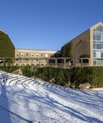Happy Christmas from Johnny Laursen
Season’s greetings to staff and students from the acting dean of the Faculty of Arts.

Dear staff and students
I think we will all remember 2014 as a year of great debate and major changes. The AU problem analysis was announced in June. On 15 August the senior management team presented its follow-up proposals, and on 22 October we presented the decisions that had been made about AU’s organisation and working procedures.
One important result of these decisions is that our administrative centres are going to be linked more closely to our faculties in future. We are very pleased about this, and we look forward to an even closer partnership with our administrative staff and administration centre manager.
Since August the faculty has also been involved in an intensive (but also very positive) process focusing on the way the faculty should be organised in future. I am actually writing these words a few days after reading all the profound and constructive consultation responses we have received regarding the faculty management team’s proposals. And I’d like to thank everyone who has made their views known at meetings and in written responses.
A few days ago the faculty management team added the finishing touches to a raft of decisions in response to people’s wishes for more decentralisation, more accessible management and more dialogue. The departments have also been asked to resolve a range of issues in the first few months of 2015. You could even argue that this was the faculty’s Christmas present to all our staff and students.
I think most people will understand that a good number of my waking hours have been taken up with faculty business over the past six months. But my overriding impression is one of overwhelming help and support for the project that the rector has asked the faculties to carry out – not only from the Dean’s Office, department heads and administration, but also from our liaison committees, staff and students.
The time spent on clarifying the faculty’s future organisation and working procedures has been characterised by everyone’s best efforts. We didn’t always agree (this is the Faculty of Arts, after all!), but a constructive atmosphere has prevailed throughout. But even though it’s been a pleasure to be part of this process, we can’t go on reviewing our organisation for ever. The process must end soon! The faculty management team is very aware of the fact that our staff and students need these organisational issues to be sorted out, so they can make plans for what lies ahead in 2015.
Of course it’s quite natural for a dean to focus a lot on organisational issues, but it’s also important to remember that 2014 was yet another year with plenty of other achievements to be proud of in all areas of our activities. Despite the organisational challenges we’ve been facing, high quality standards have been maintained with regard to our education, research and public-sector consultancy activities. This was confirmed by the study environment survey. Our research and communication work continues unabated, as well.
Some of the highlights for me were the launch of the Centre for Urban Network Evolutions, and the research communication award for work done on the history of Danish childhood and schools. It’s also worth remembering the huge contribution made by our archaeologists, anthropologists and history of ideas scholars to the brand-new, fantastic Moesgaard Museum, which opened this year.
The recent report by the Forum for the Coordination of Educational Research might have been more discreet in terms of its design, but you don’t have to read many pages before realising just how vital our Department of Education is to the world of educational research in Denmark. However, these are just a few highlights – we must never forget the faculty’s excellent and enthusiastic teaching, extensive communication and consultancy services, huge number of academic publications and impressive research grants.
And finally, it’s worth pointing out that the faculty’s financial situation at the end of 2014 looks stronger than expected. Indeed, things are looking so good that even after investing in improvements of our classrooms and study environment, we can still make a substantial contribution to the university’s overall result.
The government’s degree programme resizing initiative has put a frown on the faces of many staff and students, who are concerned about the financial future and the framework of our degree programmes. Reductions in the number of student places will constitute a major challenge in the years ahead. Even though the model we ended up with is an improvement on its ill-conceived predecessor in several respects, it still contains a great number of unfortunate consequences. In particular, we have expressed our dissatisfaction that our students are going to be tied more firmly to the universities and degree programmes in which they enrol for their Bachelor’s degree.
The restrictions imposed on the internationalisation of our degree programmes and the intake of students from professional Bachelor’s degree programmes also constitute a major problem which we need to explain to the decision-makers in the near future. The efforts made by the university during these negotiations, and the rector’s assurance that this is a challenge facing the whole of AU and not just our faculty, have been the silver lining in an autumn characterised by a cloud of uncertainty regarding the final result.
It is also encouraging that the faculty management team and boards of studies were so quick to agree that the reductions of student places in 2015 should be allocated neutrally. This means that during the spring of 2015 we can discuss the problems with the departments and faculty liaison bodies (and the students) before making long-term decisions about 2016 and beyond. There’s every reason to face the future with confidence.
The spring of 2015 will involve a review of our degree programmes to find out how we can join forces to strengthen their academic standards and financial situation despite the new conditions we will have to face. Naturally, this will be done in close cooperation with our departments, boards of studies and other local liaison bodies.
I hope that the government’s resizing initiative doesn’t cast too dark a shadow on 2015, and that we will continue to pursue new opportunities and take pride in the results achieved in our core activities. Even though I hope that this period of debate and change has now come to an end, I also hope that the Faculty of Arts continues to demonstrate its talent for humour and determination – as well as maintaining the flexibility and close sense of community for which we are so well known. I hope you all enjoy the Christmas and New Year holiday with your family and friends.
Merry Christmas and Happy Holidays!
Johnny Laursen

